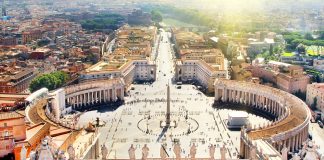Florin Lăiu
The disgrace of (anti-)Catholicism
This topic seems to be a matter of picking through the rubbish in order to survive. Who cares about Protestant protest today? Anti-Catholicism, like anti-Protestantism, represents natural and culturally legitimate attitudes that can be judged by their motivation, spirit and content—aspects that are apparently obscure but, when examined, become very transparent.
The mystery of the seventh day (I)—the earth bears witness
The Grace Community, an American Evangelical church, publishes on its website a large number of e-books, including some religious, apologetic ones, such as Open Letters to an Adventist by Michael Morrison and Joseph W. Tkach, an old and ongoing dispute on the subject of the day of rest[1].
Anti-papism: realism or paranoia? (III) The idol and the mark of the “beast”
Beginning with media commentary on Dr Ben Carson's religion and views, and scholars' criteria for the identity of the Antichrist, our study has analysed in two previous articles the scandalous possibility that the apocalyptic Antichrist is the papacy itself, the axis of historical Christianity.
The Second Coming Files: A 2000-Year Investigation | Part VII: Adventism After the Great Disappointment
At the end of a journey tracing how the belief and hope in the Second Coming of Jesus have manifested themselves in the two-thousand-year history of Christianity, the final part of The Second Coming Files presents the remaining elements that link that history to the present day: the Millerite movement and Adventism.
Anti-papism: realism or paranoia? (II)
In the first part of this series, we familiarised ourselves with the classical Protestant perception of the concept and prophetic figure of the Antichrist, and evaluated the classical identification of the Antichrist with the papacy. Further analysis becomes even more intriguing with a close reading of the major biblical prophecies about the Antichrist.
The Second Coming Files: A 2000-Year Inquiry | Part VI: Waiting for the return of Jesus in 19th century...
The expectation of the soon return of Jesus in 19th century Europe and America has left a path for believers and future believers to tread with confidence. Beyond the imperfect theological understanding of the forefathers, of which no one need be ashamed, God has shown that He can use any material, provided it is consecrated to Him.
Antipapism: realism or paranoia? (I)
In late 2015, famed neurosurgeon Ben Carson, who was running for the Republican presidential nomination, became the target of scrutiny and innuendo from some in the media, who used the moment to turn his religious identity on its head. Ben Carson is a Seventh-day Adventist, and people wanted to know how Adventism influences his thinking. Carson lost the election race, but won a...
The Second Coming Files: A 2000-Year Inquiry | Part V: Nineteenth-Century Millenarianism in the British Isles
After covering the historical evolution of the Christian teaching about the return of Jesus Christ in the first three articles, in the fourth article, which precedes the one that you’re reading now, I made a minimal review of some philosophical, political, religious, and esoteric currents that are important to understand the world in which the millenarian revivals of the 19th century emerged.
The Second Coming Files: A 2000-Year Inquiry | Part IV: The world in the 18th-19th centuries
In the first three articles in this series, we examined what Scripture says about the coming of Jesus, and also how the biblical books of Daniel and Revelation remain the foundations of understanding time.
The Second Coming Files: A 2000-Year Inquiry | Part III: Modern Millenarianism
While the historic churches remained at least disinterested in millenarianism, the Apocalypse, and the Parousia—that is to say, when they were not hostile to them—Protestant pluralism allowed for both reluctance[1] and increasingly significant preoccupations with the research and publication of the themes regarding the end of the world.
The Second Coming Files: a 2000-Year Inquiry | Part II: Millenarianism as a forgotten orthodoxy
Right from the first centuries, the scenario of the second coming of Jesus was interpreted spiritually-allegorically by some, and politically-ecclesiastically by others. As we have learned from the previous article of this series, even the main millenarian movement in antiquity (Montanism) led to an anti-apocalyptic reaction on the part of moderate Christianity. Is this rejection of apocalyptic millenarianism justified? What does Revelation actually...
The Second Coming Files: A 2000-Year Inquiry | Part I: The fossilisation of the great Christian hope
Any religion’s popularity depends on the rewards it promises. While people are interested in the immediate benefits of this life, they are mostly interested in the future, the hope their religion brings, and how solid it is.
The great persecution
A movement so alive and distinct from the imperial cults, as Christianity was, could not fail to attract the attention of temple servants, intellectuals, and officials.
The Unitarian Movement | How an unorthodox minority contributed to the development of the Reformation
The Unitarian Movement was defined as a significant minority movement under the influence of Humanism. The name “Unitarians” comes from the belief in one divine Person, a belief also common to Judaism and Islam, as opposed to the doctrine of the Trinity.
There are hidden gospels that expose religious manipulation. True or false?
On the basis of ancient, hidden non-canonical gospels, some commercial and half-learned scholars propagate sensational discoveries, which are in fact both old and novel speculations arising from the Bible’s silence on some aspects of Jesus’s life.


























